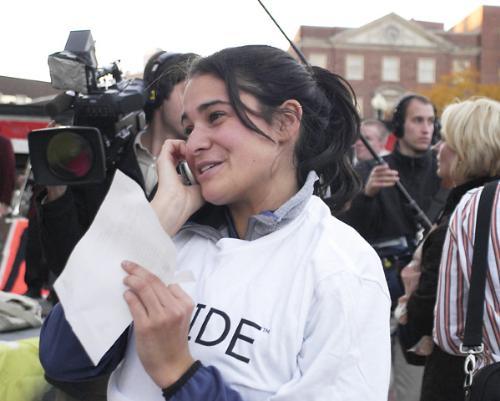
News
Summers Will Not Finish Semester of Teaching as Harvard Investigates Epstein Ties

News
Harvard College Students Report Favoring Divestment from Israel in HUA Survey

News
‘He Should Resign’: Harvard Undergrads Take Hard Line Against Summers Over Epstein Scandal

News
Harvard To Launch New Investigation Into Epstein’s Ties to Summers, Other University Affiliates

News
Harvard Students To Vote on Divestment From Israel in Inaugural HUA Election Survey
‘I DECIDE’ Calls Swing States

What do you do if you’re worried your vote doesn’t count? For two Winthrop House seniors from California and Massachusetts, the answer was obvious: start a national youth mobilization campaign.
Roommates Leslie S. Bishop ’05 and Rebecca Leventhal ’05 founded the non-profit, non-partisan, “I DECIDE” six weeks ago with the help of Winthrop Master Stephen P. Rosen ’74 and other members of the House.
The group began by selling “I DECIDE” t-shirts at Harvard and on the internet, and each sale also paid for a second shirt to be sent to universities in swing states to encourage students there to vote. The pre-election push culminated in a rally yesterday outside the Harvard T station, drawing 50 to 60 students from around the Boston area.
Each participant called students in Pennsylvania, Florida and Ohio, urging them to vote and then asking them to call three more of their friends in what amounted to a massive phone tree.
The atmosphere was festive, with musicians playing on top of the T stop and TV trucks waiting nearby. Tourists and passersby were curious about I DECIDE, and many bought shirts or called swing states.
“It’s ridiculous that only 30 percent of registered youth voters turn out at the polls,” said Devin Lyons-Quirk ’05, who volunteered to make calls on his cell phone. “It’s easy to just make three phone calls to help fix this problem.”
Boston College sophomore Lindsey A. Keefner came all the way to Harvard Square to call. “It is important for youth to vote because we are the ones who are going to have to deal with the decisions made in the next four years,” she said.
The callers received varied responses from the swing-state voters.
“I talked to people who had already sent in their absentee ballot and who were really excited about voting, but I also talked to people who don’t believe in voting, are not registered and don’t care,” said Margo B. Hoppin ’05.
Though Bishop and Leventhal had expected 300 students to show up, they said they were pleased with the event despite the small numbers.
“Everyone who showed up was so excited to call that we got through all the phone numbers we had despite the low turnout,” said Bishop. “Also, a lot of kids took numbers to call later, so more people were involved than were actually there calling.”
In addition to the rally yesterday, the I DECIDE campaign has spread around the country, gaining national media attention. Over 3,000 shirts have been sold.
Bishop and Leventhal said they wanted to come up with a way for students from non-contested states to influence the election by partnering with students in swing states.
“We then went down and did an event at Penn State and the shirts were really hot and it just took off: our first 400 shirts went in 30 minutes,” Bishop said. “We got a lot of publicity through the Penn State Collegian and local news, and a few days later they ordered 1,000 more shirts.”
At Penn State, hundreds of people wore their shirts to events featuring Michael Moore and Fox News’ Mike Gallagher. Since then, Bishop and Leventhal were featured in Newsweek, and made it on to CBS’s “The Early Show.” They have also been contacted by ABC’s Barbara Walters, who requested t-shirts for the cast of “The View.”
“In order for this to become a national movement, we needed the help of the press” said Bishop. “We tried to use a gimmick or fad for a good cause by making the shirts cool.”
Bishop and Leventhal partnered with Florida State, Ohio State and Florida Atlantic Universities, in addition to Penn State, to distribute shirts in swing states. Students at 25 other colleges around the country have also bought I DECIDE shirts and organized their own rallies.
With time running out before the election, Bishop and Leventhal switched from sending out t-shirts to organizing a phone bank.
Because many students use cellular phones which are not on national call lists, they have not been contacted by other get-out-the-vote organizations. The founders of I DECIDE figured that by contacting some student voters in swing states, they could then use a “pay it forward” idea to use existing social networks to spread the message.
“This is a very easy thing for people who don’t know what to do for the election but want to do something,” said Bishop. “They just need to make three phone calls and that will plant the seed for getting out the youth vote around the country.” Leventhal added that “if everyone pushes the message forward, one phone call could swing the election.”
Bishop and Leventhal said they want to keep I DECIDE going as an organization that encourages youth involvement in politics after the election but have no concrete plans. They pointed out that voting is just one way for students to get involved and want to encourage other forms of participation.
“There are other opportunities beyond the election to make your voice heard,” said Leventhal. “We want this to continue to promote those opportunities.”
Want to keep up with breaking news? Subscribe to our email newsletter.
